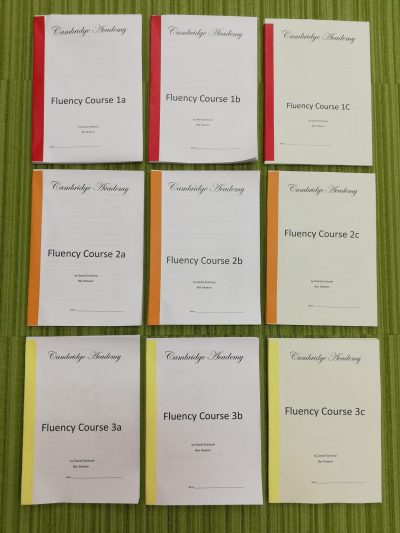Academy curriculum JHS junior high school language courses materials
by sendaiben
4 comments
The Junior High School Fluency Course

Need test partners from April 2020
After five years of writing, testing, and editing, we finally finished writing the final volume of the Fluency Course last November. You can read more about the course in the previous post.
It’s been a wonderful experience working with my writing partner Dan E. and testing the materials with students at Cambridge English.
Now we are ready to take the next step.
The next step is to test the materials. We need to find out if they will work as well for other people as they do for us. We also need to find all the mistakes that inevitably lurk within the 100,000 words of content in the course 🙂
Another question is whether the materials work if students are not doing extensive reading alongside them. I suspect they will, but would feel better having actual data.
So we are looking for a few schools that would be willing to test the materials with their students from next April. It might be a bit difficult to jump into the later stages of the course, so we are only hoping to test the year one content (matches JHS first year textbooks and school curricula).
The materials
The Fluency Course consists of a number of components. It is designed to be modular, so schools/teachers can choose which elements to use with their students. The various elements are somewhat independent from each other.
- the Fluency Coursebook contains vocabulary quizzes, reading/listening/speed reading texts, verb drills, verb quizzes, and dialogues (there may be audio files for each text, but these are not ready at time of writing)
- the Speaking Cards contain questions and model answers for speaking practice
- the Fluency Workbook contains question and answer writing practice
- the Record Sheets allow students to write their scores and times and keep track of their progress
- the monthly Reference Sheets show all vocabulary and questions for that month along with Japanese translations
- the Quizlet data sets contain vocabulary and questions that match each week of the course so that students can preview before class
The Fluency Course has 48 units, organized four to a month. The first volume of the first-year course (1a) is the easiest. The second volume (1b) is slightly harder and the third (1c) harder still. At Cambridge English we only have 44 classes a year, so we just skip the units that fall on days the school is shut.
Test partners
We would expect test partners to:
- have a number of (first year) junior high school students
- have weekly 60m+ classes
- test the materials and give us feedback
- pay a nominal fee per student to cover the cost of materials
- understand that materials are in development and thus not ‘pretty’
The course could also work with second and third-year junior high school students as supplementary material, but is designed to go with the first-year JHS curriculum.
If you successfully test the first year and wish to continue using the materials you will also have access to the second and third year courses.
If you are interested in helping us test the Fluency Course, please get in touch (Gmail, Facebook, Twitter or comment below -my handle on all is the same as the name of this blog) and we can discuss whether the materials might be a good fit for you. We are only looking for a few schools, and are hoping to have different types of school in terms of size and curriculum.
If all goes well the Fluency Course should be available to purchase normally in a year or two 🙂
I am possibly interested. Like Cynthia, Perhaps fifth and sixth grade students at my school would be best suited to a Jr High 1 curriculum.
We do 50-minute lessons, and I would be more interested in using a J-1 content level with elementary Grade 5, or perhaps G6. I would have to look at the materials to see if there was a good fit to be had. We do 44 lessons per year. Small school, but I give pretty detailed, specific feedback.